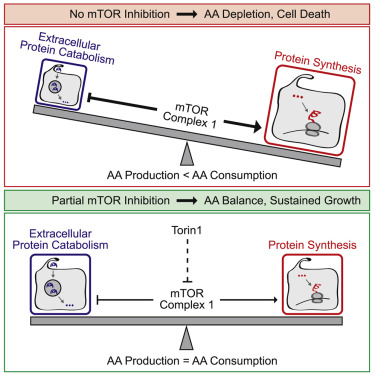Molecular Cell ( IF 16.0 ) Pub Date : 2017-09-14 , DOI: 10.1016/j.molcel.2017.08.011 Michel Nofal , Kevin Zhang , Seunghun Han , Joshua D. Rabinowitz

|
Scavenging of extracellular protein via macropinocytosis is an alternative to monomeric amino acid uptake. In pancreatic cancer, macropinocytosis is driven by oncogenic Ras signaling and contributes substantially to amino acid supply. While Ras signaling promotes scavenging, mTOR signaling suppresses it. Here, we present an integrated experimental-computational method that enables quantitative comparison of protein scavenging rates across cell lines and conditions. Using it, we find that, independently of mTORC1, amino acid scarcity induces protein scavenging and that under such conditions the impact of mTOR signaling on protein scavenging rate is minimal. Nevertheless, mTOR inhibition promotes growth of cells reliant on eating extracellular protein. This growth enhancement depends on mTORC1’s canonical function in controlling translation rate: mTOR inhibition slows translation, thereby matching protein synthesis to the limited amino acid supply. Thus, paradoxically, in amino acid-poor conditions the pro-anabolic effects of mTORC1 are functionally opposed to growth.
中文翻译:

抑制mTOR恢复依赖于细胞外蛋白代谢的细胞中的氨基酸平衡
通过巨胞饮清除胞外蛋白是单体氨基酸摄取的一种替代方法。在胰腺癌中,巨胞饮作用是由致癌的Ras信号驱动的,并大大促进了氨基酸的供应。尽管Ras信号传导可促进清除,但mTOR信号传导可抑制清除。在这里,我们提出了一种综合的实验计算方法,该方法能够定量比较跨细胞系和条件的蛋白质清除率。使用它,我们发现,与mTORC1无关,氨基酸缺乏会诱导蛋白质清除,在这种条件下,mTOR信号对蛋白质清除率的影响极小。然而,mTOR抑制促进依赖于进食细胞外蛋白的细胞生长。这种增长的增强取决于mTORC1在控制翻译速率方面的规范功能:mTOR抑制会减慢翻译速度,从而使蛋白质合成与有限的氨基酸供应相匹配。因此,矛盾的是,在氨基酸贫乏的条件下,mTORC1的促代谢作用在功能上与生长相反。



























 京公网安备 11010802027423号
京公网安备 11010802027423号